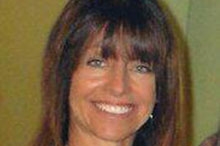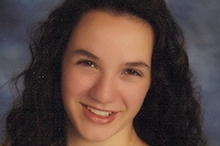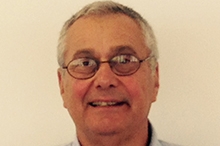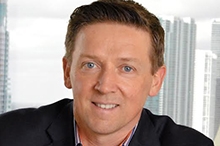Champions of Change Blog
"How Low Can We Go?" A Fun Challenge for U.S. Schools to Reduce Energy Consumption
Posted by on February 27, 2015 at 11:28 AM EST
Linda Gancitano is being honored as a Climate Education and Literacy Champion of Change.
Back in 2008, I was watching the Oprah Winfrey Show as she showed snippets of the documentary, An Inconvenient Truth. My eyes just happened to catch a scene that would change my world: the swimming polar bear who couldn’t reach another iceberg because the sea ice was melting. As the polar bear drowned, I found myself crying and thinking, this is wrong. This shouldn’t be happening. That image stayed in my mind for a long time.
In November 2008, I formed a Green Team at Driftwood Middle School (DMS) in Hollywood, Florida. Our team consisted of three teachers and three student leaders. The team has since tripled in size, and the school’s culture is visibly environmentally friendly. In fact, that was a primary objective of our first initiative: we created a visual board so that the entire school could track monthly energy usage.
Next, we raised awareness of energy conservation via the "How Low Can We Go?" Challenge—an initiative that later became partners with the Miami Heat during NBA’s Green Week to impact 64 Broward County Public Schools, the sixth-largest district in the country. If any partner could raise awareness of reducing CO2 emissions, it was the Miami Heat, voted one of the top "green" sports teams in the country.
Our first Energy Team, better known as the "DMS Chillers," walked from room to room after school looking for classrooms with lights left on. The students would leave a painted paw print (in memory of the polar bear) on the door saying, “You’ve been Chilled!” as a reminder to teachers to turn off lights when they left for the day. Our teachers and custodial staff started to get really involved in conserving energy. No teacher wanted a big paw print on their door on Monday morning!
Next up, the Green Team took to creating an Energy Audit Team that ventured into classrooms and made suggestions to the teachers and other students on how to conserve energy. Last year's new initiatives included the "Are You S.E.K.C.?" (Stopping Excessive Kilowatt Consumption) and the "Are You a H.E.R.O.?" (Helpful Energy Resource Officer) campaigns. The students hand out green H.E.R.O. bracelets when they catch a teacher or another student conserving energy. Since the Green Team was formed in 2008, the school has seen a 23% decrease in emissions. Our greatest challenge in decreasing energy even further is technology, an antiquated cooling system that needs to be replaced. DMS continues to expand our alternative energy education by including future projects, such as solar power and a wind turbine, to the curriculum. The tradition of the DMS Chillers lives on, impacting our 1,600 students and faculty.
So, How Low Can You Go?
Our partnership with the Miami Heat initially has enticed schools to rise to the challenge of reducing their environmental footprint. Not only by raising awareness of the effects of CO2 emissions but also educating the facilities on potential financial savings through responsible energy consumption. Curtailing wasteful spending on unnecessary energy consumption has the added benefit of allowing schools to allocate those saved dollars to under-funded programs. In the one-month pilot program in February 2014, we saved over $34,000 in energy costs and reached over 90,000 faculty and students. This school year, with 87 schools registered for the challenge, the impact will reach over 100,000. Future possibilities include South Florida's Tri-County Area and the whole country!
Won't you join us?
Linda Gancitano is a Physical Education and Wellness educator at Driftwood Middle School in Broward County, Florida.
Learn more about Energy and EnvironmentA Generation of Hope
Posted by on February 27, 2015 at 11:24 AM EST
Gina Fiorile is being honored as a Climate Education and Literacy Champion of Change.
It is an honor to be selected as a White House Champion of Change because I am representing countless students and youth leaders who work tirelessly to combat climate change.
My generation is one of subtle controversy. Recent advances in technology have been openly accepted by youth, and because of this, we have become the most social generation in history. Our interconnectedness may come with a few negative effects, but there are also significant positive outcomes that result from our social nature. We are more mindful, more aware, and have more opportunities to support each other.
My passion for climate education began in high school, where I became involved in the annual Adirondack Youth Climate Summit. This two-day conference is held at a local science museum where students from across the Northeast gather to learn about climate change and create climate action plans to implement in their schools. Not only do students have the opportunity to learn from renowned climate scientists, but they are also able to build a community around their environmental passions and connect socially. This summit changed my life in that it inspired me to dedicate my career to the cause. It also opened the eyes of thousands of students. It is has been adopted as a model for similar programs across the country as part of the White House’s Climate Education and Literacy Initiative, and has spread internationally. My peers and I had the opportunity to be featured in a PBS documentary titled “The Resilient Ones,” which followed us throughout the planning process. After my experience at the Summit, I was inspired to take on a number of projects including waste reduction, the building of a greenhouse and school garden, the local farm-to-school movement, and communications with the community. My work and motivation is an example of the outcomes of successful climate education.
I do not believe it is a coincidence that the generation I am a part of has arrived at the same time in history as human-induced climate change. We now have the tools we need to communicate the effects of climate change and fully understand the science behind it. We have the capacity to build a network around climate science and climate education in the battle for sustainability.
It is time we take advantage of the opportunities we have created for ourselves to fight this battle with full force. An attitude of realism as opposed to negativity is what will carry us through. It is important that we look to future generations as a source of hope when we feel discouraged by setbacks on the road to sustainability. Our greatest defense in this fight is an increase in climate literacy, so that future leaders are better prepared to catalyze positive change.
Climate change is one of the greatest challenges we have faced because it is an issue that will impact every single human being and living thing now, and for millions of years to come. If this is the case, how can we not do everything in our power to combat it? In accepting our responsibility to educate future generations by utilizing all of the resources we have, the next generation will be more capable to combat this challenge. They are a source of hope during this period of ecological and social change.
Gina Fiorile is a freshman Environmental Studies Major in the Rubenstein School of the Environment and Natural Resources at the University of Vermont.
Learn more about Energy and EnvironmentThe White House Recognizes HBCU Leaders Who Are Champions of Change for Advancing College Completion Among African American Students
Posted by on January 30, 2015 at 10:14 AM ESTThis Black History Month, the White House will recognize faculty and staff members at Historically Black Colleges and Universities (HBCUs) that drive the college completion agenda. These leaders work with students, families, higher education leaders, and policymakers to build paths to graduation.
To reach President Obama’s goal of helping our nation lead the world in college completion by 2020, we must ensure that more African American students graduate from college. Currently, the college graduation rate for African American students is 34.3 percent, compared to 47.1 percent for Asian students, 46.2 percent for white students, and 41.05 percent for Hispanic students (National Center for Education Statistics, 2015).
HBCUs meet the challenge. Innovative strategies and visionary leadership can advance college completion among African American students. For more than a century, HBCUs have been exemplars in producing African American college graduates who lead their fields. A recent report from the National Science Foundation revealed that 21 of the top 50 institutions for producing African American graduates who go on to receive their doctorates in Science and Engineering (S&E) are HBCUs. In total, between 2002 and 2011 among the top 50 institutions, HBCUs collectively produced 1,819 African American graduates who earned a doctorate in S&E, predominately white institutions produced 1,600, and foreign institutions produced 798.
Learn more about EducationNominate a White House Champion of Change for Climate Education and Literacy
Posted by on December 11, 2014 at 4:37 PM ESTCommunities across the United States are working to advance understanding of climate variability and change. Local leaders are helping to increase science-based understanding and awareness of current and future climate change, enhancing climate literacy in K-12 classrooms, on college and university campuses, and in parks and museums across the country.There has been tremendous progress to date, but there is still more work to be done.
A climate-literate workforce will be required for tomorrow’s community leaders, city planners, and entrepreneurs to have the information, knowledge, and training to make sound choices and grow businesses in the context of a changing climate. That’s why on December 3, the White House Office of Science and Technology Policy (OSTP) launched the Climate Education and Literacy Initiative, focused on connecting Americans of all ages with the best-available, science-based information about climate change. This initiative builds upon a Call to Action around climate education and literacy that received nearly 150 submissions from schools, communities, individuals, and organizations across the country. These responses demonstrated the magnitude and diversity of efforts underway and articulated ideas for future action.
Today, we’re asking you to help us identify and honor local leaders who are taking action to enhance understanding of climate change as Champions of Change for Climate Education and Literacy. These extraordinary leaders will be invited to the White House to celebrate their accomplishments and amplify their work to promote climate education and literacy as a critical step toward building an educated, next-generation American workforce that grasps the climate change challenge and is equipped to seek and implement solutions.
Please submit nominations by midnight on Tuesday December 23rd, 2014. Nominees may include the following types of individuals:
- Educators who serve as leaders in promoting and integrating best-available climate science into their classrooms.
- Outstanding students who demonstrate a high proficiency in climate knowledge and skills and leadership both inside and outside of the classroom.
- Young scientists who are advancing understanding of climate impacts and solutions.
- Leaders from, organizations that are developing high-quality, science-based tools, resources, and other learning opportunities for students of all ages.
- Individuals from place-based institutions (zoos, parks, aquaria, museums, etc.) that are effectively engaging visitors around climate change.
- Business leaders taking action to enhance understanding and awareness around climate change.
Click on the link below to submit your nomination (be sure to choose Climate Education and Literacy in the "Theme of Service" field of the nomination form):
Nominate a Climate Education and Literacy Champion of Change
We are looking forward to hosting this event and to highlighting the incredible work that people across the country are doing to advance climate education and literacy.
Laura Petes is Senior Policy Advisor for Climate Adaptation and Ecosystems in the Office of Science and Technology Policy.
Learn more about Energy and EnvironmentHelping Those Who Help Themselves
Posted by on October 30, 2014 at 1:02 PM EST
Les Lak is being honored as a Promoting Citizenship in the Workplace Champion of Change.
My grandparents came to this country from Poland with nothing but the clothes on their backs, a strong work ethic, and desire for a better life. Today, their children and their children’s children are part of the backbone of this country. Because of the struggle of my grandparents, I can empathize with our employees at Blasch Precision Ceramics who are immigrants. We currently employ immigrants from countries all around the world, including Sudan, Yemen, Russia, and Bosnia and Herzegovina. Many of these people endured – and still endure – the same challenges that my grandparents endured almost a century ago. We are passionate about providing our employees with tools necessary to becoming U.S. citizens.
The Literacy Volunteers of Rensselaer County have played a key role in opening the door of opportunity to those who work for us looking for a better life in the United States. Founded in 1968, Literacy Volunteers of Rensselaer County (LVORC) is a nonprofit volunteer organization helping hundreds adults, families, and children learn how to read, write in, and speak English. Blasch works closely with our local chapter to provide workplace literacy instruction to our foreign-born workers. We understand that providing this service has enormous benefits to both the employees and Blasch. Employees participating in these classes increase are motivated to contribute more to the success of Blasch, ultimately contributing to our bottom line.
As part of this program, employees are able to take advantage of citizenship preparation classes, civics classes, computer training, money management training, high school equivalency instruction, and math tutoring. Because of this extensive training, six of our current employees have received their U.S. citizenship.
We feel that it is important to recognize the sacrifices and struggles that our immigrant employees faced just getting to the United States. From the beginning, they have demonstrated a strong will and determination to succeed.
The sheer number of people that this program touches makes it a real feel-good story. Employees hail from war-torn countries seeking better lives. Volunteers give up their own time to help them prepare for citizenship. This is their award, too.
I have gotten to know many of our employees. They tell me about their families, their countries, how well their kids are doing, their hopes and dreams. I highly respect them and enjoy hearing their success stories. This award is their story, and it is the same beautiful story played out over decades by millions seeking a better life who have helped make America great.
Les Lak is the Vice President of Operations and Systems at Blasch Precision Ceramics in Albany, NY.
Learn more about ImmigrationInvesting in Employees
Posted by on October 30, 2014 at 1:01 PM EST
Robert Hill is being honored as a Promoting Citizenship in the Workplace Champion of Change.
From the outside, managing a hotel may appear straightforward. We provide a comfortable place to stay for our guests and host major conferences and events. But if you scratch the surface, it’s easy to understand why running a large hotel operation is kind of like running a small city.
The InterContinental Miami hosts 500,000 people per year. No matter who our guests are or where they come from, they all expect a high caliber of service and a comfortable environment. Making sure our hotel runs smoothly is a team effort. On any given day, more than 350 colleagues work on our property. Being located in a large gateway city like Miami, a large percentage of our workforce is made up of team members who – like our guests – come from somewhere else.
Because we view all of our colleagues as part of the InterContinental Miami family, we made the decision to help our non-native colleagues navigate the path to U.S. citizenship.
As a very fortunate immigrant who arrived in America from Ireland with a lottery U.S. Resident Green Card twenty years ago, I have experienced first-hand how the task of earning citizenship can be daunting and difficult. It just made sense to support the New American Workforce, a nonprofit organization who could facilitate the U.S. citizenship process for our colleagues and for the more than 8.8 million immigrants who are eligible to apply.
From organizing application workshops and civics instruction to helping individuals through the often confusing and expensive process for free, the New American Workforce fills a critical role in our society.
Since partnering with the New American Workforce in 2012, more than ten InterContinental Miami colleagues have achieved U.S. citizenship, and four more are on the path to completing the process within the next year. Citizenship allows these individuals to make long-term investments in their families, communities, and our local Miami economy.
It also makes business sense. Our hotel spends significant resources each year on colleague development and training. Retaining non-native members of our team through citizenship enables us to generate a long-term return on our investment while building colleague loyalty and helping us cultivate talent from within.
Our colleagues who have benefited from our program often ask how they can give back themselves. Fortunately, our hotel is involved in a number of nonprofit organizations that make it possible to help others in our community. The best example of this is our hotel’s 20 year partnership with Make-A-Wish of Southern Florida, in which the annual InterContinental Miami Make-A-Wish Ball raises millions of dollars for the organization each year.
The partnership we have forged with the New American Workforce over the years has been a pillar of our commitment to people—the same people who are fueling our hotel’s success.
Robert Hill is the General Manager of the InterContinental Miami hotel.
Learn more about Immigration
- &lsaquo previous
- …
- 7
- 8
- 9
- 10
- 11
- 12
- 13
- 14
- 15
- …
- next &rsaquo
White House Blogs
- The White House Blog
- Middle Class Task Force
- Council of Economic Advisers
- Council on Environmental Quality
- Council on Women and Girls
- Office of Intergovernmental Affairs
- Office of Management and Budget
- Office of Public Engagement
- Office of Science & Tech Policy
- Office of Urban Affairs
- Open Government
- Faith and Neighborhood Partnerships
- Social Innovation and Civic Participation
- US Trade Representative
- Office National Drug Control Policy
categories
- AIDS Policy
- Alaska
- Blueprint for an America Built to Last
- Budget
- Civil Rights
- Defense
- Disabilities
- Economy
- Education
- Energy and Environment
- Equal Pay
- Ethics
- Faith Based
- Fiscal Responsibility
- Foreign Policy
- Grab Bag
- Health Care
- Homeland Security
- Immigration
- Innovation Fellows
- Inside the White House
- Middle Class Security
- Open Government
- Poverty
- Rural
- Seniors and Social Security
- Service
- Social Innovation
- State of the Union
- Taxes
- Technology
- Urban Policy
- Veterans
- Violence Prevention
- White House Internships
- Women
- Working Families
- Additional Issues

